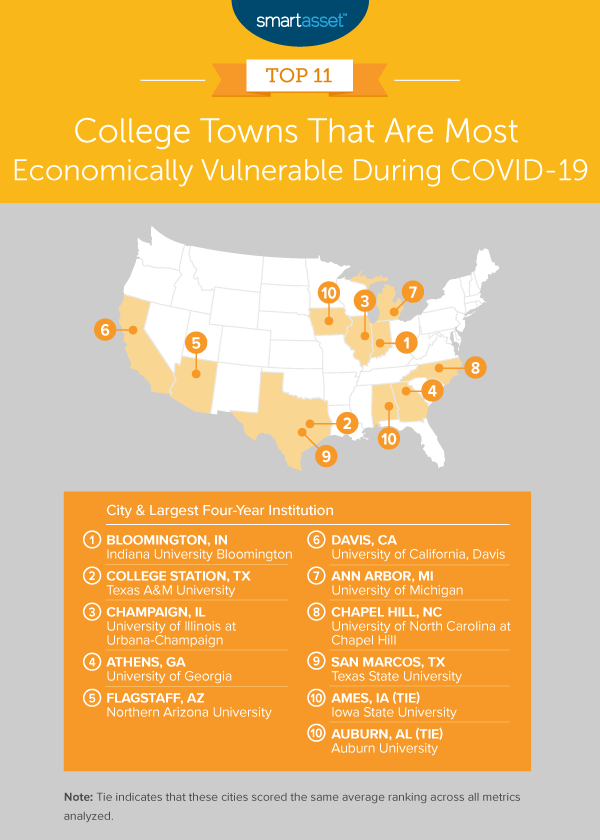Small businesses have been seriously struggling since the outbreak of COVID-19. According to NBC, college towns have been turned into ghost towns as students all moved home for the pandemic, and small businesses are hanging by a thread.
SmartAsset, a company that strives to give financial advice and security to millions of people, recently conducted a study that showed which college towns are most economically vulnerable due to COVID-19. College Station ranked second, falling just behind Bloomington, Indiana, the home of Indiana University Bloomington.
Casey Luneva, a SmartAsset representative, talked about how the study came to be and why the company decided to conduct the study. Luneva also said SmartAsset only took account of cities that had four-year colleges and a population of 50,000 or more.
“We decided to crunch the numbers to find the college towns that are most economically vulnerable due to COVID-19 as these cities may confront major losses in population and revenue if students do not return to campus,” Lunerva said. “Even in places where schools will resume in-person classes in the fall, local businesses that typically rely on spending from the student body may still suffer.”
Luneva said the company created the rankings using six different factors.
“To determine the most economically vulnerable college towns due to COVID-19, we considered six metrics that indicate a dependence on student presence and spending habits,” Luneva said. “They include: undergraduates as a percentage of the population, college staff as a percentage of workers and the concentration of restaurants and bars, bookstores, entertainment establishments and hotels.”
For College Station, one determining factor revolves around the large student population according to Luneva. The student population adds over 60,000 people to the area’s population during the school year.
“Our data shows that undergraduate students taking in-person classes at Texas A&M University make up 44.59 percent of the local population, the second-highest percentage out of all 95 college towns we analyzed,” Luneva said. “Meanwhile, university staff make up 19.54 percent of the local workforce, the 14th-highest percentage in our study.”
Luneva said another contributing factor is the entertainment industry and various hotels around the area. Due to the pandemic, even with students coming back this semester, there will be less revenue coming in, especially with bars being forced to close, many events being cancelled and restaurants having reduced capacity.
“Additionally, data shows that the town’s economy relies heavily on local hotels, restaurants and bars, which are all likely to suffer economically from reduced student spending,” Luneva said. “Specifically, the area ranks in the top 15 for its relatively high concentration of restaurants and bars, which make up 9.27% of all establishments in the city, as well as hotels.”
Greg Hartman, the Vice Chancellor for Strategic Initiatives, Texas A&M University System Senior Vice President and Chief Operating Officer for Texas A&M Health, said he would like to know SmartAsset’s methodology before speaking on the validity of the study. Hartman believes SmartAsset most likely used the population of just College Station, and not the entire Brazos Valley.
“If you have a very large university, like Texas A&M, or even Texas State, both of which are a part of the largest universities in the state of Texas, and you’re applying them to what is an inappropriate, very small city, which is just the specific city limits around the university and not the overall metropolitan area, you’ve got a really large university being laid on top of an incorrect, very small city,” Hartman said.
A&M is among many colleges that are facing issues with small businesses and will most likely face challenges down the road. Hartman said it will take many months before the economic effects of the virus will change, but he is hopeful that the economy will return to what it was before the pandemic began.
“This economy has always been a good, strong economy before COVID. It has always been an economy that has bounced back relatively quickly. I think the university plays a big role in helping to some extent to moderate things,” Hartman said. “I know I am an optimist, and eventually we’re going to be back in a good place. I think we’re going to have to work our way through a challenging next few months.”
For more information about this study, click here.
College Station ranks second as most economically vulnerable college town in nation during COVID-19
July 27, 2020
Photo by via smartasset.com
College Station was ranked the No. 2 college town most economically vulnerable during COVID-19.
0
Donate to The Battalion
Your donation will support the student journalists of Texas A&M University - College Station. Your contribution will allow us to purchase equipment and cover our annual website hosting costs.
More to Discover









